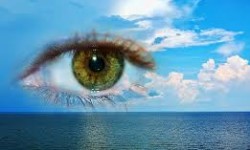Do you fully intend to see when you look? Peter Grunwald, the developer of the Eyebody Method of vision improvement, says “Intention leads, the eyes and the body follow”. This sounds so simple! Then why do so many of us have trouble seeing clearly? I think we start getting off-track when we try to see, expending unnecessary effort in what is meant to be an easy automatic process. You shouldn’t have to try to breathe or listen or taste, nor should you have to try to see.
There’s a big difference between “trying to see” and having the intention to see. When I’m trying to see, some part of me thinks it will be an effort, a struggle. So I strain against that imagined resistance, at least a little bit. When I intend to see, I expect to see — I just direct my gaze and look. It’s as simple as intending to walk across the room, or to lift my arm to reach something high, and just doing it. I have the intention, then shift my sight accordingly, moving my head if I need to, then finally move my body to accomplish what I want, just as Peter said.
Something else which can get in the way of seeing clearly is wanting to see, and wanting not to see at the same time. Maybe we’re tired and we’d prefer to rest instead of to keep working. Maybe we’re in an argument, facing an angry person, or receiving criticism, and we’d rather not look at their angry face. We can feel the negative hostile energy coming right into us through our sensitive eyes, and who wants that? Yet maybe it’s our boss, or a parent disciplining us when we’re a child, and we feel obligated to look, while trying not to see too much!
Remember seeing, or not seeing, is your choice. If you don’t want to look, you can always look away, or close your eyes, or leave the scene. As a child, or as a powerless employee of a dictator boss, you may not have had that choice in the past. Now you do, so take advantage of it. Your eyes deserve pleasant scenes and views that make you feel happy. And so does the rest of you! As Dr. Bates said, you see best what pleases you (an optimum), and worse what displeases you (a pessimum). What a good reason to put yourself in circumstances which feel good! See well, and you’ll be well.
get help on our Facebook Group!

I wore strong glasses, then contact lenses, from age 5 into my 40s. While making many mistakes, eventually l learned how to improve the way I use my eyes and to see in a more relaxed, healthy manner. It is my pleasure to coach others to do the same. Visit me at https://NancyLNeff.com.

Marloes, great! I might write an article about this soon, since it’s simple to do and gives surprising benefits. And it’s about the mind, where vision really happens. If you think about it, every moment IS new, if only because you yourself have never been exactly the same person you are right now. Keep up the good work, and the enthusiasm!
I just went to the supermarket and pretended it was the first time I was there. I felt like a tourist! “Oh, they have cheese over here …” Real fun! I’ll do this more often. It was relaxing for my eyes in a way, but I need more practice. Thanks for the exercise!
Marloes, yes! Simple awareness of this habit is a first step to changing it. Play a game of pretending you’re in a brand-new scene, looking around and taking it in. What is THAT? No expectations, no trying. Have fun with it!
Trying to see is a very strong habit. I find it very difficult to let it go. The idea that you don’t try to listen or taste either does help. Strange actually, that we don’t ‘try’ with all the other senses, but we do ‘try’ with vision.
Seeing/not seeing is a choice. I’ll keep that in mind!
Thank you!
Thanks for reading, my friend! Enjoy your clear sparkling day.
Definitely, a bit of your wisdom to carry with me throughout my day today. Thank you, Nancy! xo